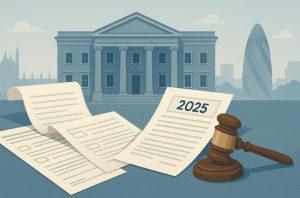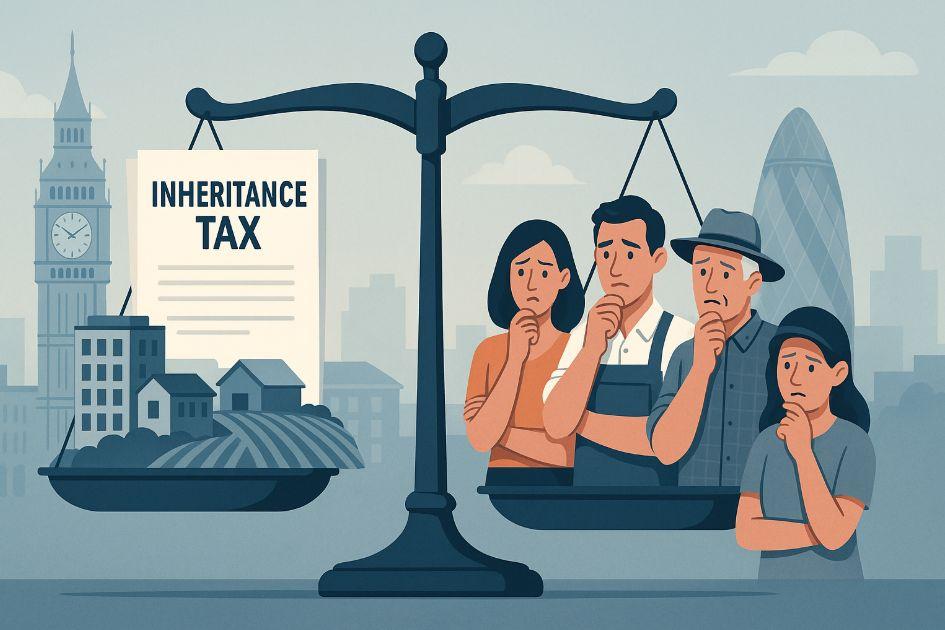In a landmark announcement shaking the foundations of the UK’s tax landscape, Chancellor Rachel Reeves has introduced sweeping changes to inheritance tax. These reforms, targeting Business Property Relief (BPR) and Agricultural Property Relief (APR), are poised to reshape the future of family owned enterprises and agricultural holdings across the nation. With businesses facing the threat of increased liabilities and the economy bracing for potential setbacks, it is vital for families and entrepreneurs to grasp the full scope of these changes.
This guide explores what the inheritance tax changes mean, who will be affected, and what proactive steps businesses can take to mitigate the looming challenges.
What Are Rachel Reeves’s Inheritance Tax Changes?

Rachel Reeves’s proposed changes to inheritance tax represent some of the most substantial revisions to the system since it was first established.
The reforms primarily focus on narrowing the eligibility criteria for Business Property Relief and Agricultural Property Relief, key mechanisms previously used to ease the inheritance tax burden for family businesses and farms.
Understanding the Core of the Reforms
Previously, BPR and APR offered significant relief, often up to 100%, on qualifying assets, allowing for smoother intergenerational transfers without the crushing burden of a 40% inheritance tax. However, the revised framework imposes stricter definitions and conditions, thereby excluding a broader swathe of businesses and agricultural properties.
Inheritance Tax Thresholds Remain the Same
Despite these structural adjustments, the inheritance tax threshold often referred to as the “nil-rate band” remains unchanged at:
- £325,000 for individuals
- £650,000 for married couples or civil partners
Any estate value exceeding these limits will be subject to the 40% inheritance tax, now with fewer exemptions for business and farm assets.
How Will the New Inheritance Tax Reforms Impact Family Businesses?
Family businesses are the backbone of the UK economy, contributing to local employment and regional development. These inheritance tax reforms pose a significant risk to the stability of the sector, potentially disrupting longstanding family enterprises.
Reduction in Investment and Expansion
Businesses are already reporting anticipatory shifts in investment strategies. More than 60% of family firms foresee a need to curtail investments by at least 20%. The reforms could curtail business expansion, capital improvements, and long-term strategic growth, particularly in vulnerable sectors like manufacturing, retail, and hospitality.
Operational Downsizing and Workforce Cuts
Facing increased tax exposure, many businesses are preparing to downsize their operations. A recent study forecasts potential job losses affecting 208,500 roles across the UK, with small businesses and family-run enterprises particularly at risk.
What Are the Specific Changes to Business Property Relief (BPR) and Agricultural Property Relief (APR)?
The most consequential adjustments concern the eligibility for BPR and APR, protections traditionally available to family businesses and agricultural properties.
Business Property Relief (BPR) – A Stricter Gateway
Previously, BPR offered up to 100% relief on qualifying business assets, provided the company was trading rather than investment-oriented. Under the reforms:
- Stricter definitions will disqualify a broader range of businesses, particularly those with mixed trading and investment activities.
- Professional service firms and other non-manufacturing businesses may find themselves excluded.
Agricultural Property Relief (APR) – Narrowing the Scope
For agricultural enterprises:
- The definition of “agricultural property” is tightened.
- Land not actively farmed or used for agricultural production will no longer qualify.
- Farm diversification efforts, previously seen as a resilience strategy, could now render farms partially ineligible for relief.
How Much Economic Loss Is Predicted Across UK Sectors and Regions?

The economic impact of these reforms extends far beyond individual businesses, touching nearly every sector and region of the UK.
Predicted Sectoral Impact
The sectors expected to suffer the most include:
- Agriculture and Horticulture: Facing 17% reductions in investment.
- Construction: Similar 17% cut in capital expenditure.
- Manufacturing and Real Estate: Anticipated 16% decline.
- Retail and Wholesale: Expected 15% drop in investment.
Regional Disparities in Economic Damage
Certain regions are more vulnerable:
- Yorkshire and the Humber, East of England: Leading with a 17% projected decline in business investments.
- The North West, North East of England, and Scotland: Expected to endure workforce reductions of approximately 10%, highlighting the regional vulnerability.
- Cornwall and Aberdeen shire: Identified as the most vulnerable constituencies, with multiple towns among the hardest hit.
Analysts forecast that the economy could contract by £14.86 billion in activity before the close of the current parliamentary session due to these tax changes.
What Are the Expected Effects on Job Markets and Investments?
Workforce Reduction Across Industries
The employment market is poised to experience:
- Employment in the North West and North East regions is projected to decline by between 10% and 12% as businesses adjust to the new tax regime.
- Early reports indicate nearly 25% of businesses have already downsized their workforce in anticipation of tax hikes.
Investment Contraction
Long-term investments in infrastructure, technology, and expansion will also diminish. This contraction:
- Reduces productivity growth.
- Weakens regional economies.
- Diminishes the UK’s competitiveness on a global scale.
How Are Small and Family-Owned Farms Likely to Be Affected?
Farms, especially family-run ones, face unique challenges under the redefined Agricultural Property Relief.
Increased Financial Burdens
Smaller farms that previously benefited from APR may now find:
- A greater share of inherited assets will now attract the 40% inheritance tax rate under the revised rules.
- A necessity to sell land or assets to meet tax obligations, disrupting multi-generational operations.
Decline in Rural Economies
Beyond individual farms, entire rural communities may experience economic decline due to:
- Loss of farm-related jobs.
- Reduction in local spending.
- Curtailment of farm-based philanthropic initiatives supporting rural services.
What Is the Potential Fiscal Impact on Government Revenues?

While the reforms aim to boost tax revenues, emerging data suggest otherwise.
Projected Government Revenue Decline
A detailed analysis indicates:
- A £1.87 billion net fiscal loss is anticipated.
- Lowered business profits and employment will reduce corporate tax and income tax revenues.
These unintended outcomes challenge the Treasury’s goal of fiscal sustainability and could prompt reconsiderations or amendments to the policy over time.
How Can Families and Businesses Prepare for These Changes?
Adaptation will be critical for survival and success in this new tax environment.
Estate and Succession Planning
Families should urgently revisit their estate plans, working closely with:
- Tax advisors.
- Legal experts specialising in business succession.
Strategic restructuring may enable some businesses to still qualify for reliefs under the new definitions.
Asset Diversification
Diversifying asset holdings can mitigate risks associated with increased inheritance tax exposure. By spreading assets across non-business ventures or more tax-efficient vehicles, families can better manage their liabilities.
Operational Adjustments
Businesses may also consider:
- Accelerating planned investments before the reforms take full effect.
- Exploring alternative ownership structures, such as employee ownership trusts (EOTs).
What Are the Broader Implications for the UK Economy?

Beyond the direct fiscal and business impacts, the inheritance tax reforms hold wider economic implications.
Stifling of Entrepreneurial Spirit
Reduced incentives for business growth and succession may deter new entrepreneurs, a cornerstone of the UK’s economic dynamism.
Weakening of Regional Economies
With heavy reliance on family businesses and farms, regions such as the North East, Cornwall, and parts of Scotland may experience prolonged economic downturns, exacerbating existing inequalities.
Policy Reevaluation Pressure
As evidence of unintended consequences mounts, pressure is likely to build on the government to revisit and potentially revise the scope of the reforms to balance fairness with economic vitality.
Summary of Key Changes in Inheritance Tax Reform 2025
| Aspect | Before Reform | After Reform |
| Business Property Relief (BPR) | Broad eligibility for businesses | Stricter definitions; fewer businesses qualify |
| Agricultural Property Relief (APR) | Wide coverage of agricultural assets | Narrowed definition of agricultural property |
| Inheritance Tax Threshold | £325,000 (individual), £650,000 (couple) | Unchanged |
| Estimated Job Losses | N/A | 208,500 jobs at risk |
| Economic Activity Impact | Stable | £14.86 billion reduction |
| Government Revenue | Neutral | Projected £1.87 billion net fiscal loss |
Conclusion
Rachel Reeves’s inheritance tax reforms represent a pivotal shift in the UK’s fiscal and business environment. While aiming to create a fairer tax system, the changes risk undermining the very fabric of family-owned businesses and rural economies that have historically underpinned regional growth and employment.
For families and business owners, the message is clear: proactive planning, professional advice, and strategic adaptation are now more important than ever to safeguard their legacies and future prosperity.
FAQs About Rachel Reeves Inheritance Tax Changes
What is the current inheritance tax threshold in the UK?
The current inheritance tax threshold is £325,000 for individuals and £650,000 for married couples or civil partners. Estates valued above this are taxed at 40%.
How does Business Property Relief work now?
Business Property Relief traditionally allowed family businesses to pass assets down with reduced or no inheritance tax. However, under the reforms, the qualifying criteria have become narrower, limiting access to this relief.
Why is Agricultural Property Relief important for farmers?
APR provides significant tax benefits to farming businesses, allowing agricultural land and buildings to be transferred without heavy tax penalties. The reforms restrict the definition of agricultural property, increasing the tax burden on farmers.
Will these changes affect business succession plans?
Absolutely. Succession plans must now consider the potential for increased tax liabilities. Many businesses are revisiting their strategies to avoid disruption.
What sectors are most vulnerable to the reforms?
Agriculture, Construction, Manufacturing, and Retail sectors face some of the greatest threats, with projections showing severe investment reductions and job losses.
How are charitable donations impacted by the tax changes?
Many family businesses are cutting back on charitable giving due to tighter financial constraints, potentially affecting community initiatives and local charities.
Are there any proposed alternatives to the current reforms?
At this stage, there are no official alternatives, but advocacy groups are pressing for adjustments to better protect family businesses and the wider economy.









Leave feedback about this